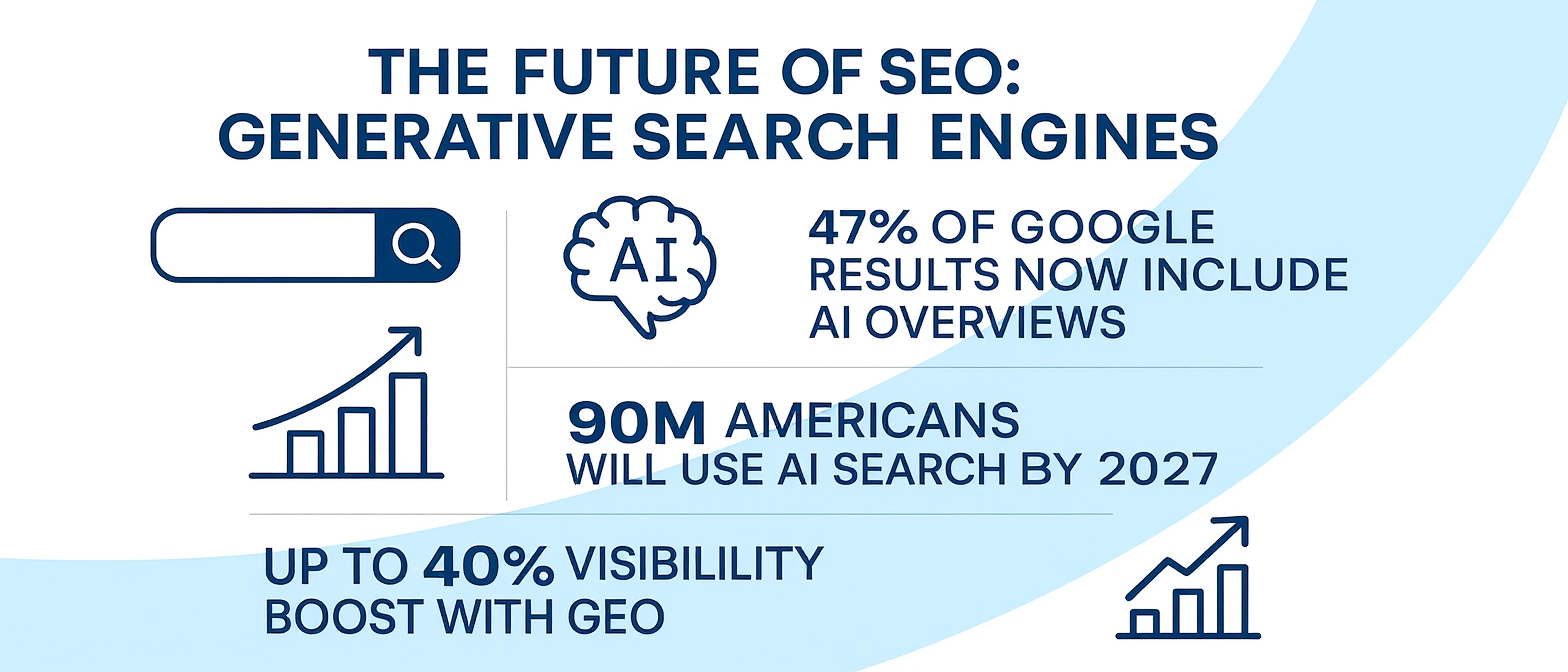The digital marketing landscape is experiencing a seismic shift that every business leader needs to understand. We’re witnessing the rise of generative search engines, and they’re fundamentally changing how customers discover and interact with brands online. If you’re still optimizing solely for traditional search engines, you’re already falling behind.
What Are Generative Search Engines?
Generative search engines represent the next evolution of search technology. Unlike traditional search engines that simply return a list of links, generative search engines use artificial intelligence to provide direct, comprehensive answers to user queries. Think of it as having a knowledgeable assistant who can instantly synthesize information from multiple sources and present it in a conversational, easy-to-understand format.
IBM defines generative search as “the combination of generative AI models with search capabilities; extending the search and retrieval capabilities of search solutions with the content generation and summarization capabilities of large language models.” In simpler terms, these engines don’t just find information – they understand it, process it, and present it in a way that directly addresses what users are looking for.
The Numbers Don’t Lie: AI Search Is Here
The statistics surrounding this shift are staggering. In 2023, approximately 13 million American adults used AI for search. By 2027, that number is projected to reach 90 million – a 590% increase in just four years. This isn’t a distant future trend; it’s happening right now.
Consider these eye-opening facts:
• 47% of Google search results now include AI overviews
• 60% of searches are completed without users ever clicking through to websites
• AI searches have already reduced organic web traffic by 15-25%
• 80% of consumers rely on AI-written results for 40% of their searches
For businesses, this represents both a challenge and an enormous opportunity.
From SEO to GEO: The New Optimization Game
Traditional Search Engine Optimization (SEO) focused on ranking in the top 10 results through keywords and backlinks. The new paradigm – Generative Engine Optimization (GEO) – is about being cited and featured in AI-generated responses.
This shift requires a fundamental change in content strategy. Instead of optimizing for search engine algorithms, we’re now optimizing for AI systems that prioritize comprehensive answers, authoritative sources, and structured information. Research shows that adding relevant statistics, quotations, and citations can boost content visibility in generative engines by up to 40%.
The Major Players Reshaping Search
Several platforms are leading this transformation:
Google AI Overviews has integrated generative AI directly into search results, appearing in nearly half of all searches. ChatGPT reached one million users in just five days and continues to grow with 10 million monthly mobile app downloads. Microsoft Copilot combines Bing’s search capabilities with creative AI features, while Perplexity AI has earned recognition as the best overall AI search experience by emphasizing source attribution and accuracy.
What’s particularly interesting is the demographic shift. Generation Z performs up to 31% of their searches on AI platforms like ChatGPT, signaling a generational change in search behavior that will only accelerate.
The Business Impact: Adapt or Fall Behind
Companies that embrace generative search optimization are seeing remarkable results. Early adopters report:
• 25-40% increase in overall organic traffic within six months
• Up to 60% increase in visibility for industry-specific queries
• 30% reduction in bounce rates due to better query matching
• 52% improvement in operational speed and efficiency
The architectural and construction industry, for example, has seen firms increase qualified leads by 49% and grow project inquiries by 32% within six months of implementing generative search strategies.
Implementation: Where to Start
The transition to generative search optimization involves several key strategies:
Content Authority: Focus on creating comprehensive, well-researched content that includes statistics, expert quotes, and authoritative citations. AI systems prioritize content that demonstrates expertise and credibility.
Structured Information: Organize content in clear, logical formats that AI can easily parse and understand. This includes using proper headers, bullet points, and structured data markup.
Answer-Focused Content: Instead of keyword-stuffed content, create material that directly answers user questions in detail. Think about the complete customer journey and address every aspect of their inquiry.
Technical Integration: Implement the technical infrastructure needed to support AI-powered search, including content analysis systems, semantic search capabilities, and response generation frameworks.
Looking Ahead: The Next Three Years
Industry predictions for 2025-2027 paint a clear picture:
• AI overviews will expand to all query types
• Voice search will accelerate, with 90% of users finding it easier than typing
• LLM-powered search engines will capture 25% of the traditional search market
• Companies without AI optimization strategies will see 30%+ traffic declines
The message is clear: the future belongs to businesses that understand and adapt to generative search. This isn’t just about staying competitive – it’s about positioning your organization at the forefront of how customers will discover and engage with brands in the digital age.
The question isn’t whether generative search will become mainstream – it already is. The question is whether your business will be ready to capitalize on this transformation or be left behind by competitors who embrace the future of search.
What’s your experience with AI search? Have you noticed changes in how your customers find and interact with your content? Share your thoughts in the comments below.





